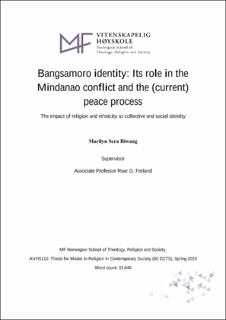| dc.description.abstract | The Mindanao conflict in the Philippines between the national Philippine government and militant groups who represent the Moro Islamic people is one of the most enduring insurgents in Asia. The two dominant militant groups are the Moro National Liberation Front (MNLF), and its faction, the Moro Islamic Liberation Front (MILF), both of which initially aimed for independence from the Philippine government since 1970s. However, acquiring independence was difficult, so both settled for autonomy, which was officially institutionalized in 2019 through the Bangsamoro Organic Law (BOL) negotiated with the MILF (not with MNLF). One of the inclusions of the BOL is the establishment of the Bangsamoro Autonomous Region in Muslim Mindanao (BARMM), and the incorporation of the Bangsamoro identity to every individual in BARMM. In this thesis, the role of the Bangsamoro identity in the conflict is investigated through Social Identity Theory (SIT). In addition, the current peace-building process through BOL is assessed through examining its current situation, and its inclusions and provisions such as the Right to Self Determination (RSD) and land distribution. Employing mixed methods research by combining both descriptive (quantitative) statistics and qualitative research data from secondary sources, this thesis shows that the Mindanao conflict is strongly attributed to identity issues. Although the Mindanao conflict is a multi-faceted problem with several actors, religion and ethnicity (collective and social identities) are strong drivers with different impacts. Religion fosters nationalism, while ethnicity fosters territorial and political conflicts within the community. Thus, religion was important during the struggle for autonomy, while ethnicity plays an important role in the current peace-building process. Indeed, some clans and other militant factions (e.g., MNLF) already show discontent with the current (interim) Bangsamoro government. This implies that BARMM has to undergo re-negotiation of identity, inter-communal societal reconciliation, and trust-building for the peace-building process to advance. | en_US |
